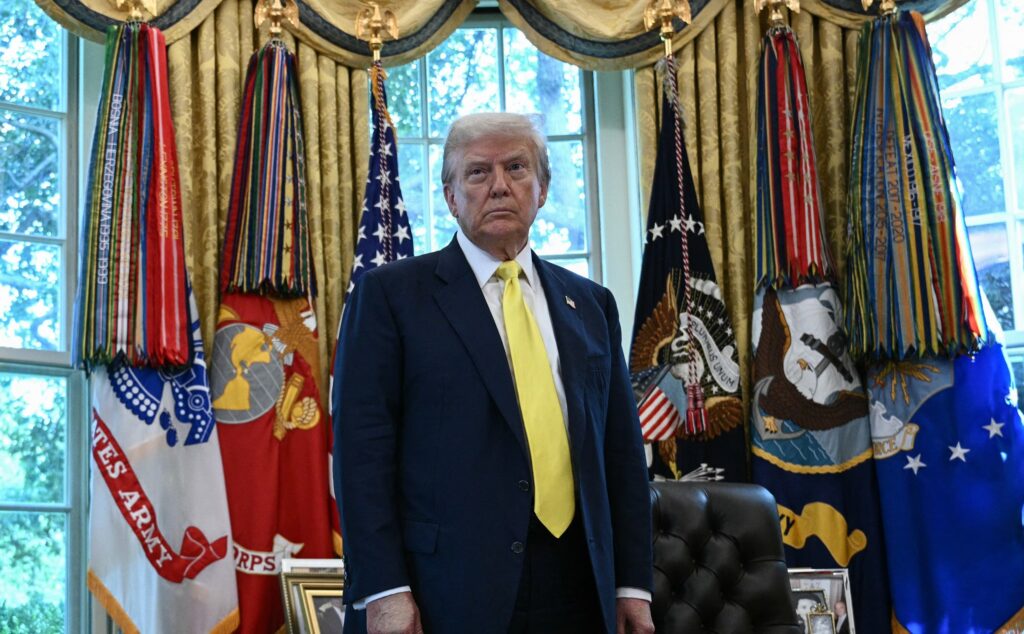On Monday, Aug. 18, 2025, President Donald Trump said he intends to end mail-in voting and ban voting machines, adding that he would sign an executive order “to help bring HONESTY to the 2026 Midterm Elections.” He also asserted that states are merely “an agent” of the federal government in counting votes and must follow his directives.
Trump’s push followed his claim that Russian President Vladimir Putin told him the United States “can’t have an honest election with mail-in voting,” and that Trump “won [2020] by so much” but lost because of mail ballots. Neither Trump nor Putin has provided credible evidence for these allegations, and U.S. election-security officials and years of research have found no evidence of widespread fraud from mail voting.
What the Constitution and Federal Law Say
- States run elections. The Constitution gives state legislatures authority over how presidential electors are appointed (Article II, §1, cl. 2) and over the “Times, Places and Manner” of congressional elections (Article I, §4) — subject to Congress’s power to make or alter those rules.
- States Constitutional Power. The Tenth Amendment reserves undelegated powers to the states.
- Presidents do not control state election procedures. Executive orders apply only to the federal executive branch; they cannot override state election laws unless Congress expressly authorizes such action. While Trump and MAGA allies currently control the House — and the Speaker has signaled willingness to advance his agenda — any attempt to codify a nationwide ban on mail-in voting would stall in the Senate, where Trump lacks the 60 votes needed to break a filibuster. Courts have already blocked major parts of Trump’s 2025 election order, reaffirming that presidential power over elections is constitutionally limited and subject to judicial review.
- Congress controls the federal timetable. Statutes in 3 U.S.C. ch. 1 set the date for appointing electors (Election Day) and when electors meet and vote; they do not ban mail-in voting or authorize a president to do so.
- Courts have affirmed state authority (with checks). The Supreme Court has long recognized broad state control over choosing presidential electors (McPherson v. Blacker, 1892) and has confirmed that state rules are still subject to state constitutions and judicial review (Moore v. Harper, 2023). Congress may preempt conflicting state rules under the Elections Clause (Arizona v. Inter Tribal Council, 2013).
What Would Happen If Trump Signs an EO to “Kill” Mail-In Ballots?
Such an order would almost certainly trigger state and private lawsuits and be quickly enjoined (paused) while courts weigh the merits—just as judges already did with parts of Trump’s earlier 2025 election order. States and local governments, which actually administer elections, would continue operating under their own laws unless Congress were to enact new federal legislation, and even then only within constitutional limits.
However, in 2024 the Supreme Court ruled that presidents enjoy absolute immunity for their official acts. That unprecedented shield raises the possibility that Trump could attempt election-related maneuvers or “shenanigans” in 2026, arguing they fall within his official duties, and thus placing them beyond criminal or civil accountability. While such moves would face political and legal pushback, the immunity ruling undeniably expands the zone in which a president might interfere with elections without fear of personal repercussions.
Critics Say It’s About “Rigging” the Midterms
Voting-rights advocates, legal experts, and political opponents argue that Trump’s pledge is another attempt to rig the 2026 midterms — not by fraud, but by stripping away a widely used and secure voting method. Mail-in ballots are especially critical for elderly, disabled, rural, and military voters. Efforts to restrict or eliminate them are seen as tilting the playing field in favor of Republicans, since Democrats have tended to make heavier use of mail voting in recent cycles.
The Role of States (and Why “States as Federal Agents” Is Wrong)
Election administration in the U.S. is decentralized: state and local officials (often Secretaries of State and county election administrators) handle voter registration, ballot issuance and return, tabulation, canvassing, and certification. Calling states “agents” of the federal government in this context misstates the Constitution and modern practice. It also smacks of Trump’s authoritarian ambitions.
Bottom Line
- A president cannot unilaterally abolish mail-in voting nationwide.
- States control election administration; Congress can legislate standards; courts police the boundaries.
- Trump’s stated plan would almost certainly meet swift, significant legal resistance.
- Critics warn it’s part of a broader pattern: using executive rhetoric to rig elections in his party’s favor by curbing access to the ballot.

